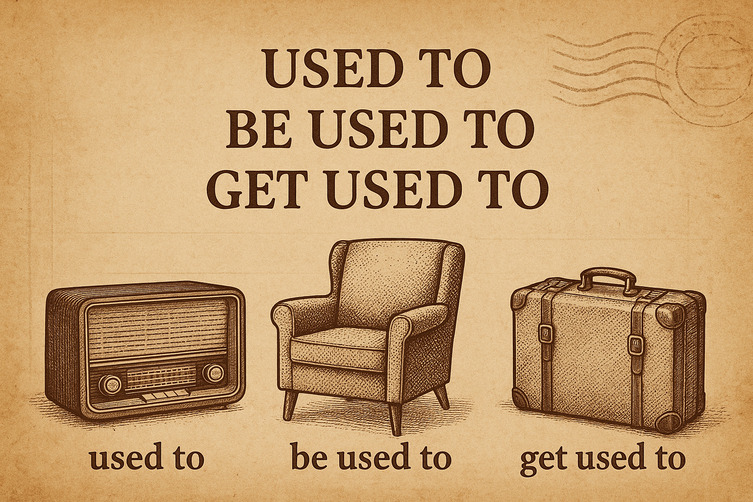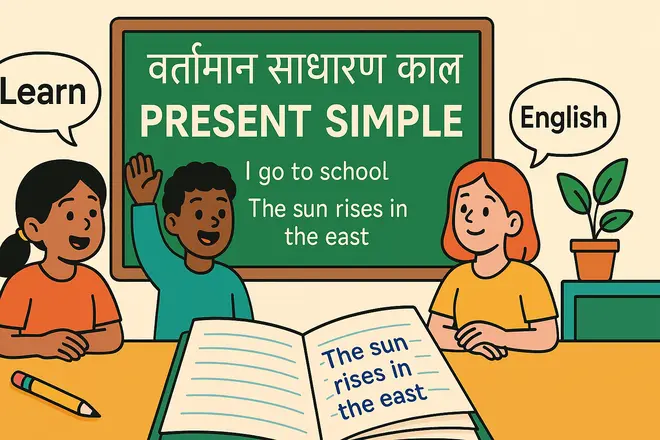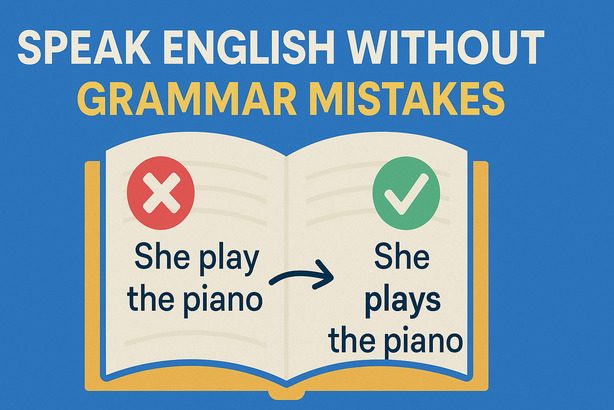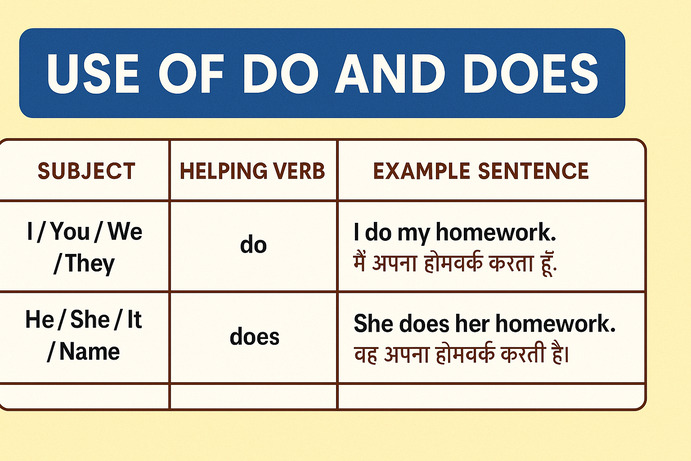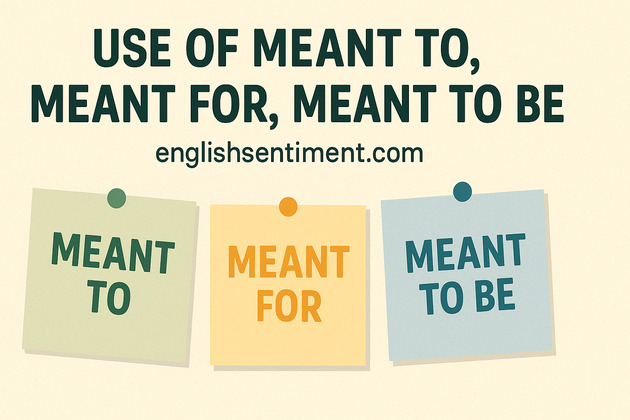Introduction: Why This Topic Matters
English learners often get confused by similar-sounding phrases like “used to”, “be used to”, and “get used to”. They look alike but function very differently in sentences. Each one serves a distinct grammatical role and expresses unique meanings. Understanding these differences is essential for speaking and writing English accurately and fluently.
Let’s break down each phrase, explore its grammar, provide real-life examples, translate them into Hindi (along with Roman Urdu), and finish with detailed exercises, common mistakes, and learning tips.
Section 1: Used To (Past Habit or State)
Definition: “Used to” describes a past habit, repeated action, or a condition that no longer exists.
Structure: Used to + base form of the verb (V1)
Hindi Meaning: कभी की कीगी आदत/हालत (Pehle ki aadat/haalat)
Roman Urdu: Pehle ki aadat ya haal
Examples:
- I used to play cricket every weekend.
(मैं हर हफ्ते क्रिकेट खेलता था । – main har hafte cricket khelta tha.) - She used to live in Mumbai.
(वह मुंबई में रहती थी । – woh Mumbai mein rehti thi.)
Important Notes:
- Only used for the past. Not used in present or future.
- In negative or interrogative forms, use “did”:
- Did you use to sing? (क्या आप गाते थे? – kya aap gaate the?)
- I didn’t use to like coffee. (मुझे कॉफी नहीं पसंद थी । – mujhe coffee nahi pasand thi.)
Key Use: Talking about something that happened regularly in the past but does not happen now.
Section 2: Be Used To (Familiarity or Habit Now)
Definition: “Be used to” means to be familiar with or comfortable doing something.
Structure: be (am/is/are/was/were) + used to + noun or gerund (verb + ing)
Hindi Meaning: किसी चीज़ की आदी होना ।
Roman Urdu: Kisi cheez ka aadi hona
Examples:
- I am used to spicy food.
(मैं तेज़ खाने की आदी हूं । – main teekha khana khane ka aadi hoon.) - She is used to studying late at night.
(वह रात रात देर रात पढ़ी पढ़ने की आदी है । – woh raat raat der padhne ki aadi hai.)
Tips:
- The verb after “used to” must be in -ing form.
- Tense depends on the be verb:
- I am used to working.
- He was used to driving in traffic.
Common Context: When something is no longer strange or difficult, and you’ve become comfortable with it.
Section 3: Get Used To (Process of Becoming Familiar)
Definition: “Get used to” expresses the process of becoming familiar or comfortable with something new.
Structure: get + used to + noun or gerund (-ing form)
Hindi Meaning: किसी चीज़ की आदत बनाना जीज़ रही है ।
Roman Urdu: Kisi cheez ki aadat daalna
Examples:
- I am getting used to waking up early.
Main jaldi uthne ki aadat daal raha hoon. - They got used to living in a big city.
Unhein badi shehar mein rehne ki aadat ho gayi thi.
Tense Variations:
- Present: I am getting used to it.
- Past: She got used to it.
- Future: You will get used to it.
Section 4: Comparison Table
| Phrase | Meaning | Structure | Example | Hindi Translation |
|---|---|---|---|---|
| Used To | Past habit or state | used to + V1 | I used to smoke. | मैं पहले धूंमा पीता था । |
| Be Used To | Comfortable with now | be + used to + noun/gerund | I am used to spicy food. | मैं तेज़ खाने की आदी हूं । |
| Get Used To | Process of becoming familiar | get + used to + noun/gerund | I am getting used to this city. | मैं इस शहर की आदत डाल रहा हूं । |
Section 5: Common Mistakes and How to Avoid Them
| Mistake | Why It’s Wrong | Correct Form |
| I use to watch TV. | “Used to” is correct, not “use to”. | I used to watch TV. |
| She is used to eat spicy food. | After “used to”, use gerund. | She is used to eating spicy food. |
| He will used to work late. | “Used to” doesn’t work with future. | He will get used to working late. |
Section 6: Exercises for Practice
Fill in the blanks:
- I ________ go to this school.
- She is ________ speaking in public.
- They are getting ________ the heat.
- He will ________ working nights.
Answers:
- used to
- used to
- used to
- get used to
Translate to English:
- क्या और जल्दी उठते हो?
- चीन की जीनगी की आदत हो गई है ।
Answers:
- Are you used to waking up early?
- She is getting used to Chinese food.
Section 7: Tips for Mastery
- Make real-life examples from your daily routine.
- Practice each phrase separately, then compare.
- Use flashcards for grammar + translation.
- Record yourself saying each sentence aloud.
- Practice writing short paragraphs using all three structures.
Conclusion
Mastering the difference between used to, be used to, and get used to will improve your ability to talk about past habits, present comfort levels, and future adaptations.
Continue practicing regularly, use the exercises, and always remember:
- “Used to” = past only
- “Be used to” = current comfort
- “Get used to” = transition or process
Want more? Check out our guides on [Present Perfect Tense], [Modal Verbs], and [Daily English Phrases] on our blog englishsentiment.com!

